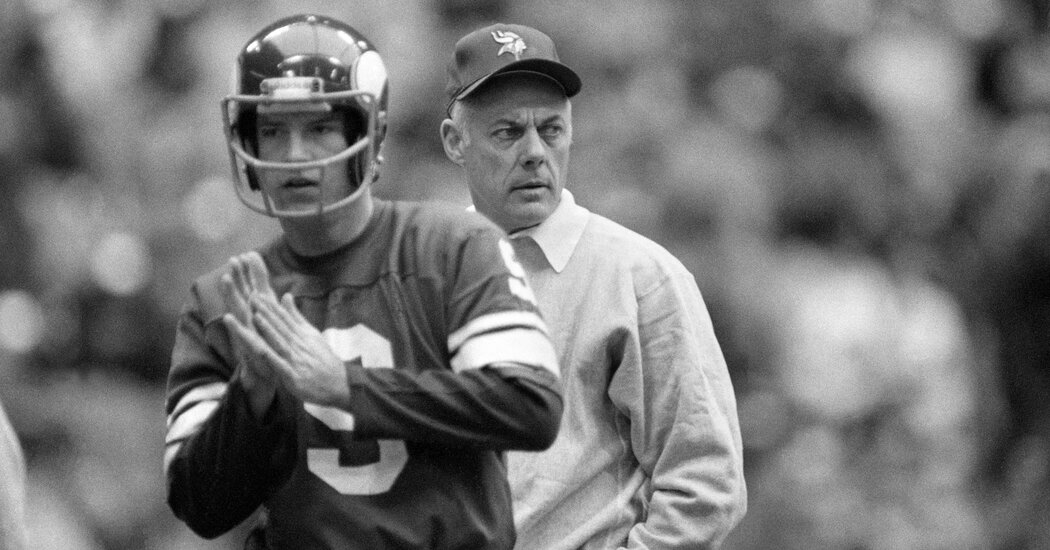
Bud Grant, Longtime Minnesota Vikings Coach, Dies at 95
Bud Grant, the stoic, strait-laced Hall of Fame coach who led the Minnesota Vikings for 18 years, building a team that went to four Super Bowls and was one of the best of the 1970s, died on Saturday at his home in Bloomington, Minn. He was 95.
The Vikings announced Grant’s death.
A genial man in private, Grant often appeared silent and aloof at work. Wiry and svelte, with a prematurely gray flattop haircut, he had the air of an ascetic field general in an era when many coaches were known for their hard-driving and often histrionic personalities.
In 1967, after a successful 10-year run coaching in Canada, Grant took over a forlorn franchise that had limped through its first six seasons of existence. He quickly built it into a winner that, along with the Dallas Cowboys and the Los Angeles Rams, dominated the National Football Conference through most of the 1970s.
He had a regular-season record of 158-96-5, for a .621 winning percentage, the most victories for a Vikings coach. His Vikings won 11 division titles and made it to four Super Bowls, but they never won; they lost to the Kansas City Chiefs in 1970, the Miami Dolphins in 1974, the Pittsburgh Steelers in 1975 and the Oakland Raiders in 1977.
His teams were led by the celebrated defensive line known as the Purple People Eaters, headed by Alan Page and Carl Eller, and by an offense that included quarterback Fran Tarkenton and running back Chuck Foreman. He was named N.F.L. coach of the year in 1969 and was inducted into the Pro Football Hall of Fame in 1994. He won 10 or more games seven times between the 1969 and 1976 seasons.
Grant was popular with his players because, unlike his contemporaries, he rarely yelled. “They start getting screamed at when they’re in Little League,” he said of his team. “The ones who make it this far are pretty good at turning it off.”
At the time, the Vikings played outdoors in Bloomington, Minn., south of Minneapolis, and Grant used the winter weather to help create a home-field advantage. He had his team practice and play games there without gloves or sideline heaters. The players were not thrilled, but they understood his thinking.
And he often kept practices light so his players could save their physical and mental energy for games. Other coaches held two and sometimes three practices a day during training camp; Grant brought his team together a week later than most, and they rarely scrimmaged. If an older player looked tired, he might get a day off.
Grant’s laissez-faire attitude extended to the regular season. He left the office in time to get home for dinner, anathema in a league filled with workaholic taskmasters. An avid hunter and fisherman from childhood, he would get up at 4 a.m., be in a duck blind 20 minutes later, stay until 7:30 or 7:45, then go to his office.
“A good coach needs a patient wife, a loyal dog and a great quarterback, but not necessarily in that order,” Grant wrote in The New York Times in 1984. “I happen to have been blessed with all three, and when I did happen to have any extra time I didn’t spend it with the quarterback.”
Some players, however, saw Grant as standoffish and cold. He had a reputation for telling players only what he thought they needed to know, and he didn’t think they needed to know much. Some of them, for instance, learned that they were starting on a Sunday not from Grant but from reporters.
“Bud was a coach that would not get too close to the players, but he was a player’s coach,” Paul Krause, the longtime Vikings safety, wrote in The Times in 1990. “We loved to play for Bud because he knew when to work us hard, but let us have fun at the same time. The current players are missing out on such experiences with their coaches and teammates, because big money has made it a bitter business.”
Unlike the best-known coaches of his era, including Don Shula, Tom Landry and Chuck Noll, Grant left quietly. He retired after the 1983 season at 56, seemingly eager to find out what life was like beyond football.
“I’ve spent every August since 1951 in training camp,” he said. “August is a blank. I have absolutely no idea of what people do in August, but I’m going to find out.”
But after his successor, Les Steckel, led the team to a disastrous 3-13 finish the next year, the team’s longtime owner, Max Winter, coaxed Grant into returning, offering him a lifetime contract and control over the football operations. Grant said he came back not because he missed coaching or needed the money, but because he wanted to repair the Vikings’ image, which he had helped build over two decades.
After finishing with a 7-9 record in 1985, he retired a second time. He finished his career eighth in total coaching victories.
Despite retiring with the dubious distinction of having lost four Super Bowls, Grant said he had no regrets. “I’m not sure it bothers me as much as it might bother some other people,” he said.
Harry Peter Grant Jr. was born on May 20, 1927, in Superior, Wis., the oldest of six children.




